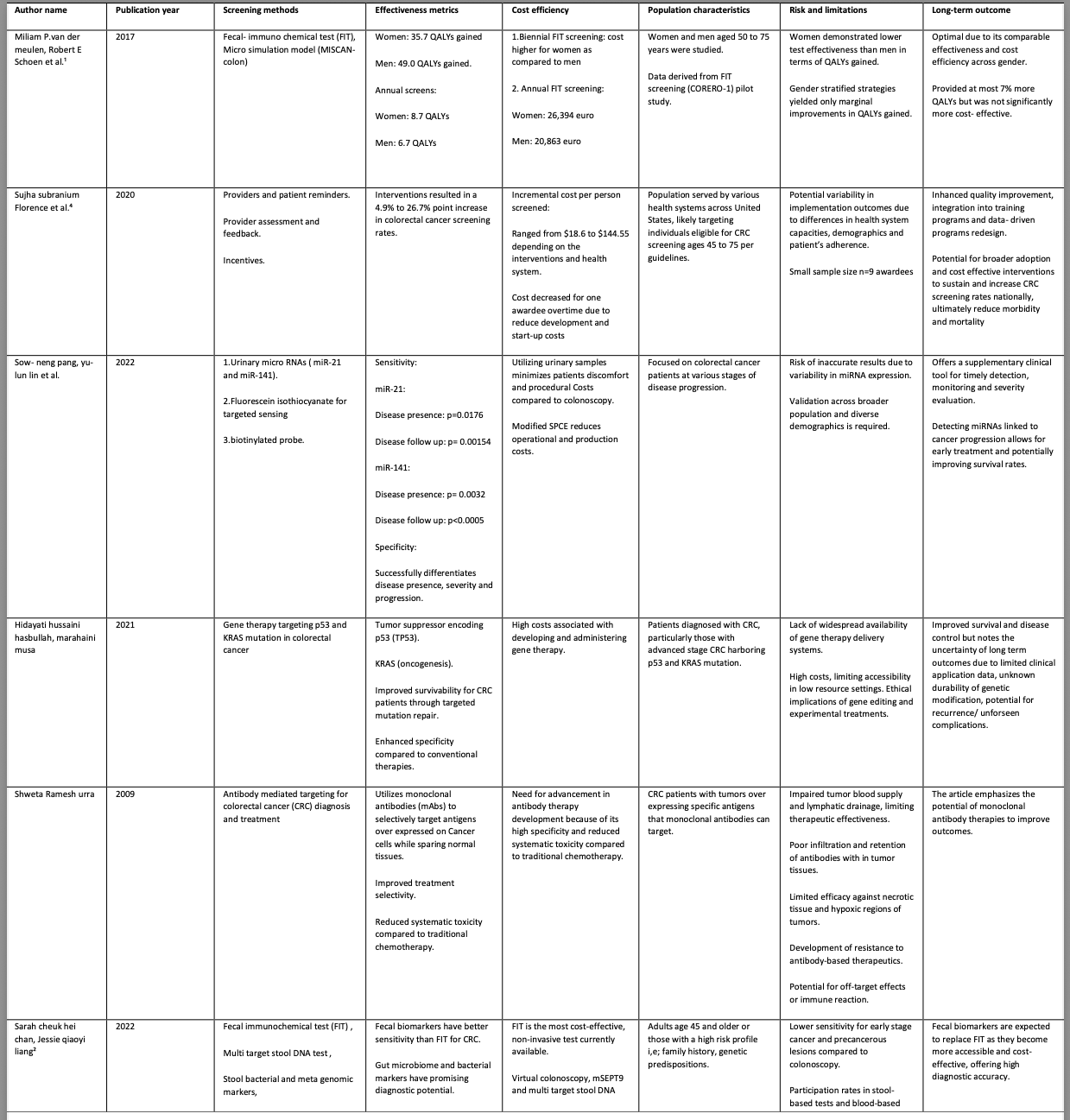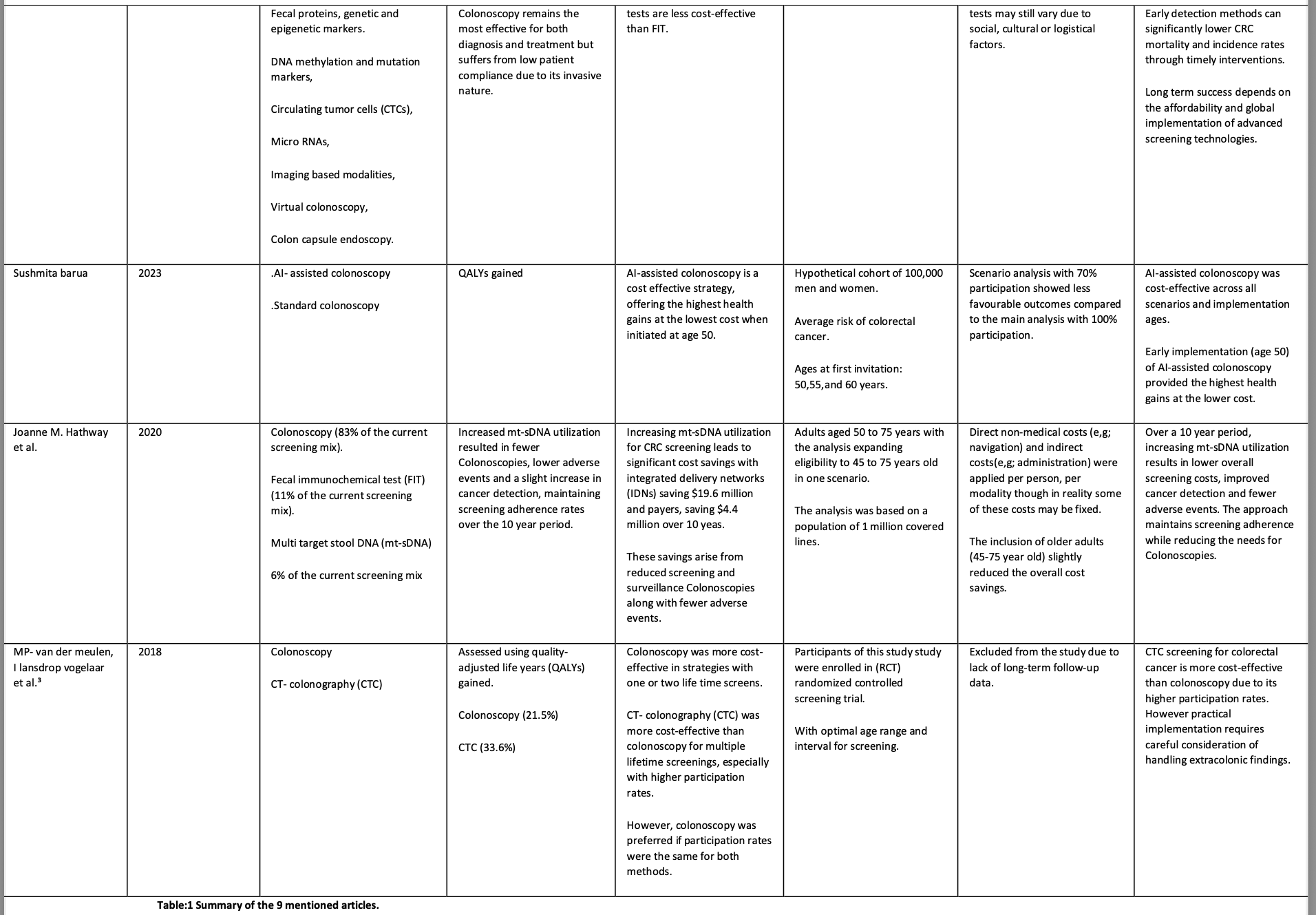Tuesday Poster Session
Category: Colorectal Cancer Prevention
P4804 - Colorectal Cancer Screening Methods: Compare the Effectiveness and Cost-Efficiency of Various Screening Methods in Different Populations - A Systemic Review
Tuesday, October 28, 2025
10:30 AM - 4:00 PM PDT
Location: Exhibit Hall

Ibrar Atiq, MD
United Health Services, Wilson Medical Center
Johnson City, NY
Presenting Author(s)
Ibrar Atiq, MD1, Abdul Subhan Talpur, MD1, Fawad Talat, MD1, Omer Usman, MD2, Zamaraq Bhatti, MD3, Usman Saeed, MD4, Azeem Khalid, MD5, Hammad Qadri, DO6, Ahmed Shehadah, MD7, Toseef Javaid, MD1
1United Health Services, Wilson Medical Center, Johnson City, NY; 2Texas Tech University Health Sciences Center, El Paso, TX; 3Methodist University, Fayetteville, NC; 4Jinnah Hospital Lahore, Lahore, Punjab, Pakistan; 5Aiken Regional Medical Centers, Aiken, SC; 6United Health Services, Wilson Medical Center, Vestal, NY; 7United Health Services, Wilson Medical Center, Binghamton, NY
Introduction: Colorectal cancer (CRC) is a leading cause of morbidity and mortality worldwide. Early detection through screening has been proven to reduce CRC incidence and mortality. Various screening methods, including colonoscopy, fecal immunochemical test (FIT), and others, are employed with varying degrees of effectiveness and cost-efficiency. However, their performance across different risk populations remains poorly understood. This systematic review aims to compare the effectiveness and cost-efficiency of commonly used CRC screening methods (colonoscopy, FIT, and others) in various risk populations, including those at average risk, high-risk, and very high-risk (genetic predisposition, family history, etc.).
Methods: A comprehensive literature search was conducted across multiple databases (PubMed, Scopus, etc.) to identify studies published between 2000 and 2024. Studies evaluating CRC screening methods in different risk populations were included. Data regarding screening effectiveness, cost-effectiveness, sensitivity, specificity, and patient compliance were extracted. Risk populations were classified as average risk, high risk (age, family history), and very high risk (genetic syndromes, inflammatory bowel disease).
Results: A total of 9 studies were included in the analysis. Colonoscopy was found to be the most accurate in detecting advanced lesions but also the most expensive and invasive. FIT demonstrated good sensitivity and specificity, particularly in average-risk populations, with lower costs and greater patient compliance. Alternative methods such as CT colonography and sigmoidoscopy showed varied results in terms of effectiveness and cost-efficiency across risk groups. The cost-effectiveness analysis highlighted FIT as the most cost-efficient method for average-risk individuals, while colonoscopy remains essential for high- and very high-risk populations.
Discussion: The effectiveness and cost-efficiency of CRC screening methods vary significantly across risk populations. While colonoscopy remains the gold standard for high-risk and very high-risk individuals, FIT offers a cost-effective and non-invasive alternative for average-risk populations. Tailoring screening strategies based on individual risk profiles can optimize outcomes and resource allocation in CRC prevention programs. Further research is needed to explore the long-term cost-effectiveness and patient outcomes associated with these screening methods in different populations.

Figure: Fig 1: Summary of 9 mentioned articles.

Figure: Fig 2: Summary of 9 mentioned articles.
Disclosures:
Ibrar Atiq indicated no relevant financial relationships.
Abdul Subhan Talpur indicated no relevant financial relationships.
Fawad Talat indicated no relevant financial relationships.
Omer Usman indicated no relevant financial relationships.
Zamaraq Bhatti indicated no relevant financial relationships.
Usman Saeed indicated no relevant financial relationships.
Azeem Khalid indicated no relevant financial relationships.
Hammad Qadri indicated no relevant financial relationships.
Ahmed Shehadah indicated no relevant financial relationships.
Toseef Javaid indicated no relevant financial relationships.
Ibrar Atiq, MD1, Abdul Subhan Talpur, MD1, Fawad Talat, MD1, Omer Usman, MD2, Zamaraq Bhatti, MD3, Usman Saeed, MD4, Azeem Khalid, MD5, Hammad Qadri, DO6, Ahmed Shehadah, MD7, Toseef Javaid, MD1. P4804 - Colorectal Cancer Screening
Methods: Compare the Effectiveness and Cost-Efficiency of Various Screening Methods in Different Populations - A Systemic Review, ACG 2025 Annual Scientific Meeting Abstracts. Phoenix, AZ: American College of Gastroenterology.
1United Health Services, Wilson Medical Center, Johnson City, NY; 2Texas Tech University Health Sciences Center, El Paso, TX; 3Methodist University, Fayetteville, NC; 4Jinnah Hospital Lahore, Lahore, Punjab, Pakistan; 5Aiken Regional Medical Centers, Aiken, SC; 6United Health Services, Wilson Medical Center, Vestal, NY; 7United Health Services, Wilson Medical Center, Binghamton, NY
Introduction: Colorectal cancer (CRC) is a leading cause of morbidity and mortality worldwide. Early detection through screening has been proven to reduce CRC incidence and mortality. Various screening methods, including colonoscopy, fecal immunochemical test (FIT), and others, are employed with varying degrees of effectiveness and cost-efficiency. However, their performance across different risk populations remains poorly understood. This systematic review aims to compare the effectiveness and cost-efficiency of commonly used CRC screening methods (colonoscopy, FIT, and others) in various risk populations, including those at average risk, high-risk, and very high-risk (genetic predisposition, family history, etc.).
Methods: A comprehensive literature search was conducted across multiple databases (PubMed, Scopus, etc.) to identify studies published between 2000 and 2024. Studies evaluating CRC screening methods in different risk populations were included. Data regarding screening effectiveness, cost-effectiveness, sensitivity, specificity, and patient compliance were extracted. Risk populations were classified as average risk, high risk (age, family history), and very high risk (genetic syndromes, inflammatory bowel disease).
Results: A total of 9 studies were included in the analysis. Colonoscopy was found to be the most accurate in detecting advanced lesions but also the most expensive and invasive. FIT demonstrated good sensitivity and specificity, particularly in average-risk populations, with lower costs and greater patient compliance. Alternative methods such as CT colonography and sigmoidoscopy showed varied results in terms of effectiveness and cost-efficiency across risk groups. The cost-effectiveness analysis highlighted FIT as the most cost-efficient method for average-risk individuals, while colonoscopy remains essential for high- and very high-risk populations.
Discussion: The effectiveness and cost-efficiency of CRC screening methods vary significantly across risk populations. While colonoscopy remains the gold standard for high-risk and very high-risk individuals, FIT offers a cost-effective and non-invasive alternative for average-risk populations. Tailoring screening strategies based on individual risk profiles can optimize outcomes and resource allocation in CRC prevention programs. Further research is needed to explore the long-term cost-effectiveness and patient outcomes associated with these screening methods in different populations.

Figure: Fig 1: Summary of 9 mentioned articles.

Figure: Fig 2: Summary of 9 mentioned articles.
Disclosures:
Ibrar Atiq indicated no relevant financial relationships.
Abdul Subhan Talpur indicated no relevant financial relationships.
Fawad Talat indicated no relevant financial relationships.
Omer Usman indicated no relevant financial relationships.
Zamaraq Bhatti indicated no relevant financial relationships.
Usman Saeed indicated no relevant financial relationships.
Azeem Khalid indicated no relevant financial relationships.
Hammad Qadri indicated no relevant financial relationships.
Ahmed Shehadah indicated no relevant financial relationships.
Toseef Javaid indicated no relevant financial relationships.
Ibrar Atiq, MD1, Abdul Subhan Talpur, MD1, Fawad Talat, MD1, Omer Usman, MD2, Zamaraq Bhatti, MD3, Usman Saeed, MD4, Azeem Khalid, MD5, Hammad Qadri, DO6, Ahmed Shehadah, MD7, Toseef Javaid, MD1. P4804 - Colorectal Cancer Screening
Methods: Compare the Effectiveness and Cost-Efficiency of Various Screening Methods in Different Populations - A Systemic Review, ACG 2025 Annual Scientific Meeting Abstracts. Phoenix, AZ: American College of Gastroenterology.
